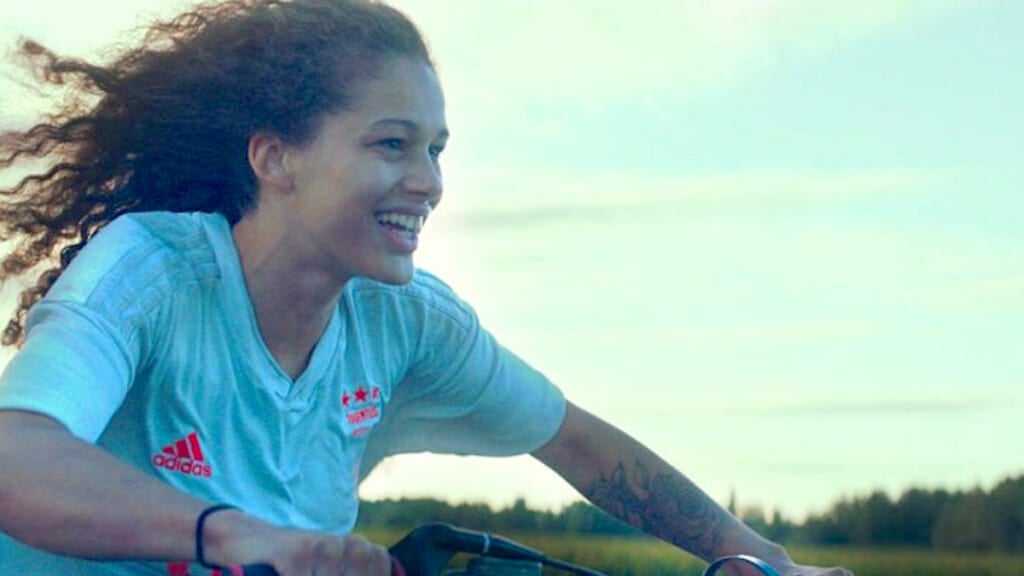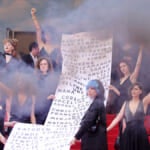No, the abortion question has not come up in Cannes, at least not so far. But if the festival has brought more female directors than ever before to ground zero for international film, it is no surprise how many of them speak in their work of the quest for freedom — a woman’s right to exist and to choose a personal destiny.
The question is, of course, urgent. Abortion rights is on all of our minds in the United States, but it’s not the only threat that women face. On Sunday, a group of female activists held up smoke bombs ahead of the screening of “Holy Spider,” a thriller by Iranian-born director Ali Abassi about a faith-driven serial killer of women in a society that has spilled from patriarchy into outright misogyny. The women from the group called “Les Colleuses” (French for “sticky ones,” as in glue) held a banner displaying the names of 129 women who have died as a result of domestic violence.
The group was in Cannes because their work is featured in another film, Marie Perennes and Simon Depardon’s “Feminist Ripost,” which deals with European women who have organized to fight sexist violence. That film was playing in the nearby Salle Bunuel at the same time as “Holy Spider,” and they were invited to give their message a high-profile platform.
As always in Cannes, the real world intrudes, and the films often pick up the thread.
“Holy Spider,” which screened on Sunday, was particularly overt in its discussion of violence against women, based on the true story of a serial killer who was supported by much of the public because he murdered prostitutes in the name of religion. It was not even made by a female filmmaker, but by the Iranian-born, Denmark-based Abbasi, whose last trip to Cannes was with the startling “Border,” which became known for its scene of troll sex.
But many other films across the range of the festival dealt with issues of women’s oppression in ways both subtle and not so.
“Corsage” by Austrian writer-director Marie Kreutzer – the title means “corset” and, well, you get the central image here – features a stunning performance by Vicky Krieps as the 19th-century Austro-Hungarian Empress Elisabeth. The film represents a bold repositioning of a beloved royal figure in central Europe, one whose memory is preserved as on a cameo pin.

But in this telling, backed by beautifully ahistorical music like Marianne Faithfull’s “As Tears Go By,” Elisabeth, known as “Sissi,” is an entirely unwilling icon. She’s imprisoned in her castle, revered by an adoring public who doesn’t know her, ignored by a cold and distracted emperor husband and ceaselessly restless for a purpose, a passion, a life of her own. (The producers are in talks with U.S. distributors, according to my sources.)
Krieps wears a crown on her very long, braided hair that are the chains that bind her to an existence she cannot bear. The empress actually died of an assassin’s bullet, a precursor to the political turmoil that led to World War I. But Kreutzer chooses a different end for her protagonist – a fate that finally frees the empress, but only through tragedy.
“Women wanting to free themselves from society’s expectations have been a subject of films for a long time, but the way these stories are told and noticed have changed,” Kreutzer wrote me in response to my emailed questions. “Women in the public eye obviously have to deal with high and actually unfulfillable expectations, today even more so. Think of that horrifying Depp/Heard trial and how Amber Heard is torn in pieces on social media. Think of Meghan Markle being observed and criticized by the press whatever she does. Think of Madonna at her 60th birthday when she said: ‘For a woman to age is a sin.’”
She added: “Women have always been and still are forced to please in order to be loved. This is what this film is about, for me.”
In “Rodeo,” the freedom of racing on a motorbike is the central image of the film, but that freedom is only possible through raging through life for Julia, played by newcomer Julie Ledru. French director Lola Quivoron moves her camera right up close into the face of her protagonist, a wild child with a face of world-worn injury and unruly hair to match. In the opening scene, she is like an uncaged animal, racing along the hallways of her rundown public housing, through an apartment, back down the stairs and into the passenger seat of a beat-up van, where she demands the men give her a ride.
It’s a bracing introduction that matches the energy that drives through the film, young men riding motor bikes on the streets and embracing crime – with Julia on her own as a angry young woman in a world of angry men.
Quivoron said she identified with her main character, and the actress Ledru who is a biker: “Like me, she has difficulty identifying herself as feminine or masculine. Julie, Julia and I are ‘nonbinary’ beings. Then, from the moment the actor meets her character, you can do anything, you just need to have a little confidence and let yourself be guided,” she wrote in the film’s notes.

Krieps once again seeks freedom in “More Than Ever,” a contemporary story about a woman dying of pulmonary fibrosis, slowly choking as her lungs give out and desperately seeking to own her choices as she faces certain death.
The female gaze, as we like to call it, is distinctive in this film. Filmmaker Emily Atef films an exquisitely long sex scene initiated by Helene (Krieps) with her husband. She undresses him, and the camera lingers on his bare chest and limbs as desired by his wife. But she ultimately relinquishes even this love to choose her own path toward death.
These are not the only films by women in the festival, which also includes “War Pony” by Riley Keough and Gina Gammell – two women who immersed themselves in an indigenous story despite not being indigenous themselves – “Blue Caftan” by Morocco’s Maryam Touzani and “The Silent Twins” by Polish director Agnieskza Smoczynka, based on a true story of twin girls (Letitia Wright and Tamara Lawrence) who spoke only to one another.
Still to come: New work from a pair of the most celebrated female directors in international cinema, Claire Denis (“Stars at Noon”) and Kelly Reichardt (“Showing Up”).
"freedom" - Google News
May 23, 2022 at 05:15AM
https://ift.tt/MSRmnQA
Female Filmmakers in Cannes Speak of Freedom and Its Price - TheWrap
"freedom" - Google News
https://ift.tt/bFM20Nx
https://ift.tt/U2TFGKV
Bagikan Berita Ini

















0 Response to "Female Filmmakers in Cannes Speak of Freedom and Its Price - TheWrap"
Post a Comment